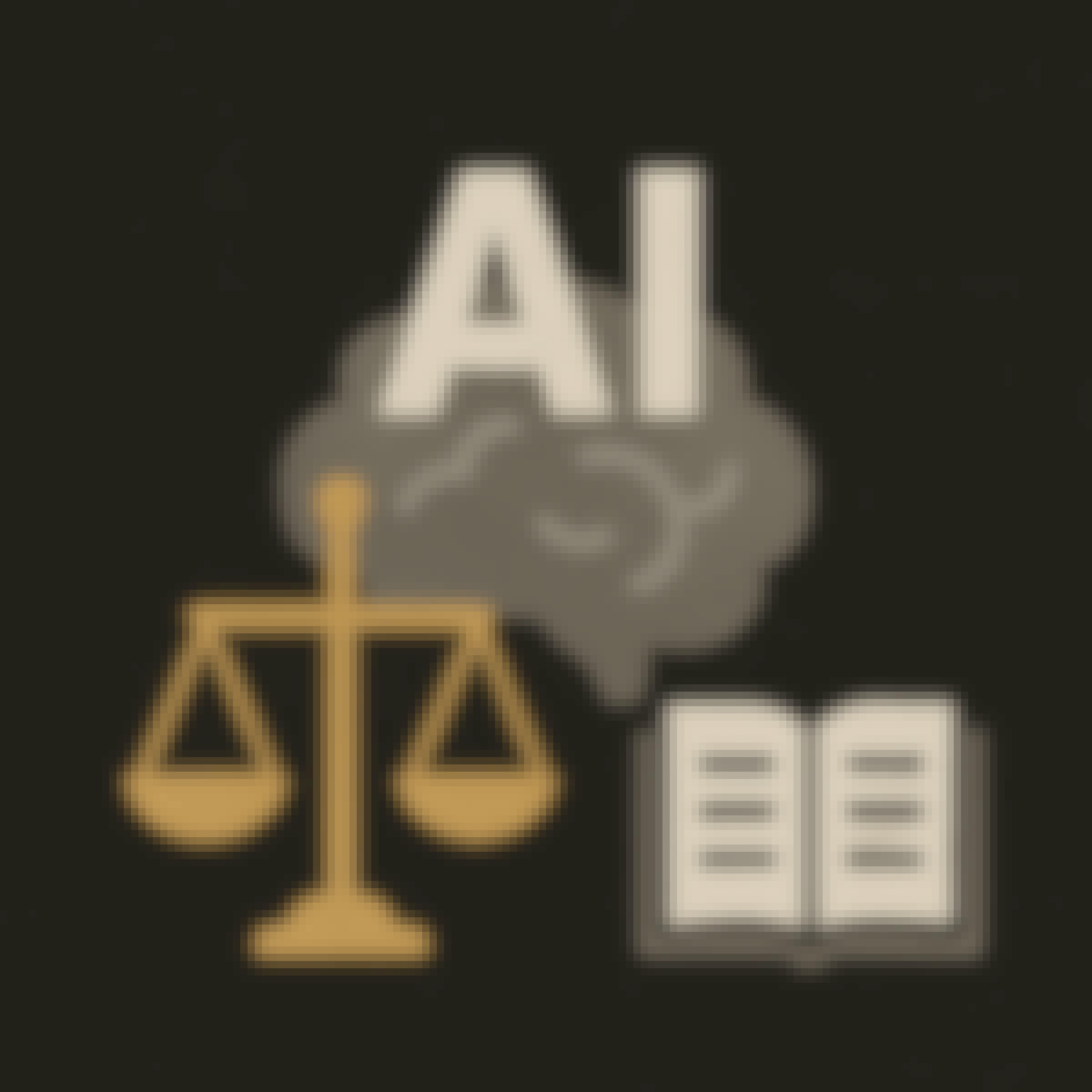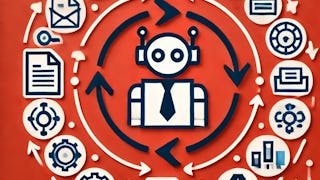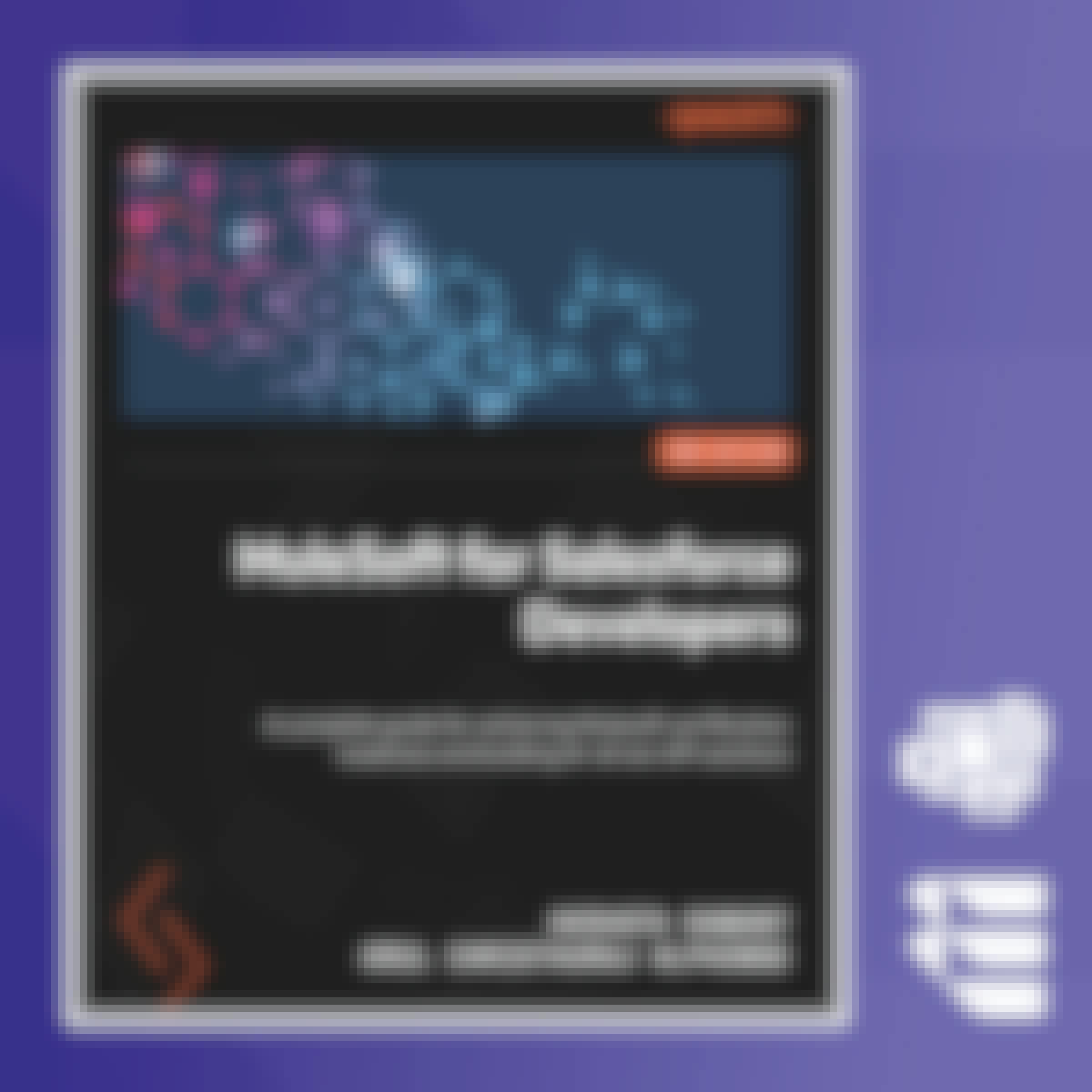- Browse
- Artificial Intelligence
Artificial Intelligence Courses
Artificial intelligence courses can help you learn machine learning algorithms, natural language processing, computer vision, and neural networks. You can build skills in data analysis, predictive modeling, and automating tasks using AI techniques. Many courses introduce tools like TensorFlow, PyTorch, and Scikit-learn, that support implementing AI solutions and developing applications that leverage these advanced technologies.
Popular AI Courses and Certifications
 Status: NewNewStatus: PreviewPreviewU
Status: NewNewStatus: PreviewPreviewUUniversity of Colorado Boulder
Skills you'll gain: Generative AI, Responsible AI, Ethical Standards And Conduct, AI Security, Robotics, Healthcare Ethics, Workforce Planning, Information Privacy, Information Technology, Robotic Process Automation, Large Language Modeling, Energy and Utilities
Beginner · Course · 1 - 3 Months
 Status: NewNewStatus: Free TrialFree TrialE
Status: NewNewStatus: Free TrialFree TrialEEmpower School of Health
Skills you'll gain: Health Technology, Healthcare Ethics, Data Ethics, Telehealth, Medical Privacy, Health Informatics, Responsible AI, Clinical Research Ethics, Law, Regulation, and Compliance, Emerging Technologies, Healthcare Industry Knowledge, Digital Transformation, Health Information Management, Health Systems, Health Equity, Information Privacy, Blockchain, Cloud Storage, Robotic Process Automation, Artificial Intelligence and Machine Learning (AI/ML)
4·Rating, 4 out of 5 stars15 reviewsIntermediate · Specialization · 1 - 3 Months
 Status: Free TrialFree TrialL
Status: Free TrialFree TrialLL&T EduTech
Skills you'll gain: Product Lifecycle Management, Embedded Systems, Manufacturing and Production, Robotic Process Automation, Manufacturing Processes, Control Systems, Computer-Aided Design, Programmable Logic Controllers, Automation, Internet Of Things, Production Process, Robotics, Digital Transformation, Engineering Analysis, C (Programming Language), Enterprise Resource Planning, Industrial Engineering, Supply Chain Management, Geometric Dimensioning And Tolerancing, Simulation and Simulation Software
4.5·Rating, 4.5 out of 5 stars26 reviewsIntermediate · Specialization · 1 - 3 Months
 Status: PreviewPreviewR
Status: PreviewPreviewRRutgers the State University of New Jersey
Skills you'll gain: Robotic Process Automation, Business Process Automation, Automation, Workflow Management, Artificial Intelligence, Accounting and Finance Software, Excel Macros, Emerging Technologies, Digital Transformation, Natural Language Processing, Data Manipulation, Unstructured Data, Scalability
4·Rating, 4 out of 5 stars7 reviewsIntermediate · Course · 1 - 3 Months
 Status: NewNewStatus: Free TrialFree Trial
Status: NewNewStatus: Free TrialFree TrialSkills you'll gain: Artificial Intelligence and Machine Learning (AI/ML), Computer Vision, Artificial Intelligence, Image Analysis, AWS SageMaker, Responsible AI, Natural Language Processing, Generative AI, Machine Learning, Prompt Engineering, Amazon Web Services, Model Deployment, OpenAI, Amazon Bedrock, Robotic Process Automation, Cloud Deployment, Customer experience improvement, ChatGPT, Data Science, Machine Learning Methods
Beginner · Specialization · 1 - 3 Months
 Status: NewNewStatus: Free TrialFree Trial
Status: NewNewStatus: Free TrialFree TrialSkills you'll gain: Robotic Process Automation, Customer experience improvement, ChatGPT, Data Science, Machine Learning Methods
Beginner · Course · 1 - 4 Weeks
What brings you to Coursera today?
 Status: NewNewStatus: PreviewPreviewU
Status: NewNewStatus: PreviewPreviewUUniversidad de Palermo
Skills you'll gain: Artificial Intelligence, IT Infrastructure, Technology Solutions, Emerging Technologies, Robotics, Robotic Process Automation, Digital Transformation, Social Impact
Beginner · Course · 1 - 4 Weeks
 Status: NewNew
Status: NewNewSkills you'll gain: API Design, Restful API, Application Programming Interface (API), Test Automation, Data Mapping, Application Deployment, Cloud Deployment, Salesforce, Robotic Process Automation, Business Process Automation, Software Testing, Data Integration, API Testing, Architectural Design, Software Development Tools, Artificial Intelligence, Artificial Intelligence and Machine Learning (AI/ML)
Intermediate · Course · 3 - 6 Months
 Status: Free TrialFree TrialR
Status: Free TrialFree TrialRReal Madrid Graduate School Universidad Europea
Skills you'll gain: AI Personalization, Artificial Intelligence, Governance, Data Governance, Emerging Technologies, Automation, Cognitive flexibility, Augmented and Virtual Reality (AR/VR), Advanced Analytics, Innovation, Robotic Process Automation, Law, Regulation, and Compliance, Ethical Standards And Conduct, Predictive Analytics, Performance Appraisal, Decision Making, Consumer Behaviour, Product Roadmaps, Investment Management, Private Cloud
Beginner · Course · 1 - 4 Weeks
 Status: Free TrialFree TrialA
Status: Free TrialFree TrialAAutomation Anywhere
Skills you'll gain: Robotic Process Automation, Business Process Automation, Automation, Process Design, Return On Investment, Role-Based Access Control (RBAC), Dashboard, Unstructured Data, User Accounts, Project Design, Feasibility Studies, Analytics, Artificial Intelligence, Development Testing, Operational Analysis, Extensible Markup Language (XML), Workflow Management, Business Analytics, Process Analysis, Administration
4.5·Rating, 4.5 out of 5 stars625 reviewsBeginner · Specialization · 3 - 6 Months
 Status: NewNewStatus: Free TrialFree Trial
Status: NewNewStatus: Free TrialFree TrialSkills you'll gain: AI Workflows, Agentic Workflows, Generative AI Agents, AI Orchestration, Model Deployment, Robotic Process Automation, Automation, AI Enablement, No-Code Development, Prompt Engineering, LLM Application, MLOps (Machine Learning Operations), Process Optimization, System Monitoring, Tool Calling, Performance Analysis, Performance Management
Intermediate · Course · 1 - 4 Weeks
 Status: PreviewPreviewR
Status: PreviewPreviewRRutgers the State University of New Jersey
Skills you'll gain: Prompt Engineering, Scalability, Large Language Modeling, Governmental Accounting, Unstructured Data, LLM Application, Financial Data, Generative AI, Accounting, Artificial Intelligence, Robotic Process Automation, Financial Reporting, Automation, Application Programming Interface (API), User Interface (UI)
Intermediate · Course · 1 - 4 Weeks
Searches related to artificial intelligence
In summary, here are 10 of our most popular artificial intelligence courses
- Current Issues in Ethics and AI: University of Colorado Boulder
- Technological advancement in Healthcare: Empower School of Health
- Digital Technology in Manufacturing: L&T EduTech
- Robotic Process Automation (RPA) in Accounting and Auditing: Rutgers the State University of New Jersey
- AI Technologies, Tools & Cloud Certification Specialization: EDUCBA
- Master AI Tools & Robotics: Analyze, Automate, Innovate: EDUCBA
- Tecnologías de la Información: Universidad de Palermo
- MuleSoft for Salesforce Developers: Packt
- El futuro de la inteligencia artificial en el deporte: Real Madrid Graduate School Universidad Europea
- Implementing RPA with Cognitive Automation and Analytics: Automation Anywhere
Frequently Asked Questions about Artificial Intelligence
Artificial intelligence (AI) refers to the simulation of human intelligence in machines programmed to think and learn like humans. This technology is crucial because it has the potential to transform industries, enhance productivity, and improve decision-making processes. AI systems can analyze vast amounts of data quickly, identify patterns, and make predictions, which can lead to innovative solutions in various fields such as healthcare, finance, and education.
A variety of job opportunities exist in the field of artificial intelligence. Roles such as AI engineer, data scientist, machine learning engineer, and AI researcher are in high demand. Additionally, positions in AI ethics, data analysis, and AI project management are emerging as organizations increasingly integrate AI into their operations. These roles often require a blend of technical skills and domain knowledge, making them accessible to individuals from diverse backgrounds.
To pursue a career in artificial intelligence, you should focus on developing a strong foundation in programming languages such as Python and R, as well as understanding algorithms and data structures. Knowledge of machine learning, statistics, and data analysis is also essential. Familiarity with AI frameworks and tools, such as TensorFlow or PyTorch, can enhance your skill set. Additionally, soft skills like problem-solving, critical thinking, and effective communication are valuable in this field.
There are numerous online courses available for learning about artificial intelligence. Some notable options include the Artificial Intelligence: an Overview Specialization and the Artificial Intelligence with Python: Foundations to Projects Specialization. These courses cover fundamental concepts and practical applications, making them suitable for learners at various levels.
Yes. You can start learning artificial intelligence on Coursera for free in two ways:
- Preview the first module of many artificial intelligence courses at no cost. This includes video lessons, readings, graded assignments, and Coursera Coach (where available).
- Start a 7-day free trial for Specializations or Coursera Plus. This gives you full access to all course content across eligible programs within the timeframe of your trial.
If you want to keep learning, earn a certificate in artificial intelligence, or unlock full course access after the preview or trial, you can upgrade or apply for financial aid.
To learn artificial intelligence effectively, start by identifying your current skill level and goals. Begin with introductory courses to build foundational knowledge, then progress to more advanced topics. Engage in hands-on projects to apply what you've learned, and consider joining online communities or forums to connect with other learners. Consistent practice and exploration of real-world applications will reinforce your understanding and boost your confidence.
Typical topics covered in artificial intelligence courses include machine learning, natural language processing, computer vision, and robotics. Courses often explore the ethical implications of AI, data bias, and algorithm limitations. Additionally, learners may study specific applications of AI in various industries, such as finance, healthcare, and scientific research, providing a comprehensive understanding of the field.
For training and upskilling employees in artificial intelligence, courses like the CertNexus Certified Artificial Intelligence Practitioner Professional Certificate are particularly beneficial. These programs are designed to equip professionals with the necessary skills to implement AI solutions effectively in their organizations, fostering a culture of innovation and adaptability in the workforce.










